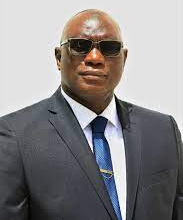By Nelson Manneh
Speaking on behalf of the Minister of the Interior, the Minister of Defence, SeringModou Njie, on the eve of the occasion of the commemoration of the World Drug Day 2024, said the Government of the Gambia is determined to ensure that it dismantles any organized criminal network that may emerge within the jurisdiction of the Gambia.
“We will deal with any such group without compromise to safeguard our society, especially the youth from misery and the sufferings caused by the use of illicit drugs,” he said.
Today June 26, 2024, marks the commemoration of the International Day against Drug Abuse and Illicit Drug Trafficking also referred to as World Drug Day.
The world drug day, according to him, is a day when Anti-Narcotic institutions and collaborative partners in the fight against drugs and related activities reflect on achievements made over the years, highlight challenges, educate and sensitize the public on the dangers of illicit drug trafficking and abuse as well as foster public support, cooperation and participation in the crusade on drugs and related activities.
“The United Nations General Assembly on the 7th of December, 1987 passed resolution 42/112 that sets aside the commemoration of this day as an expression of the international community’s determination and commitment to strengthening actions and cooperation against all forms of drug abuse, illicit drug trafficking, and related transnational organized crime,” he stated.
This year’s theme “The Evidence is Clear: Invest in Prevention” stresses the importance of adopting a scientific evidence-based approach that prioritizes prevention, treatment and care, harm reduction, and alternative livelihood programs in solving the world drug problem.
“As such, we must intensify efforts aimed at strengthening our supply suppression regimes, we must also integrate and prioritize person-centered drug demand reduction initiatives aimed at preventing the onset of drug abuse, providing treatment for Substance Use Disorders (SUD), aftercare treatment related services and alternative livelihood programs that will effectively respond to the drug problem and efficiently abate prevalence of the dealing, trafficking and abuse of drugs,” Minister Njie stated.
According to the Minister, The Gambia, through the Drug Law Enforcement Agency (DLEAG), and relevant stakeholders has over the years been proactively implementing drug demand reduction programs and activities such as weekly radio talk shows, school sensitization programs, community outreach initiatives, and capacity-building training to boost the capacity of youth, Civil Society Organizations and Community-based Organizations engaged in preventive drug demand reduction programs and activities.
Similarly, he said DLEAG has been launching Drug-Free Clubs (DFCs) in several schools across the country, just to name a few.
Regarding treatment and care, Njie said the Agency with funding support from the United States Bureau of International Narcotics and Law Enforcement Affairs (INL) collaborated with the Colombo Plan Drug Advisory program (DAP) in organizing a yearlong training on the Universal Treatment Curriculum (UTC), also known as International Standards in Drug Treatment for relevant stakeholders such as the DLEAG, The Ministry of Health – Psychiatric nurses, Department of Social Welfare, CSO’s, JAIDTOC, religious leaders and two reformed drug addicts.
He said in 2019, Gambia’s anti-narcotic agency secured funding from the ECOWAS Commission Drug Unit for the establishment of a specialized drug treatment facility in the country, adding this was delayed because of COVID-19. However, it is in progress.
“Fellow Gambians, the 2023 World Drug Report indicates that global drug usage continues to increase with a sharp rise in the global production and seizure of cocaine, methamphetamine, cannabis, and varying forms of synthetic drugs,” he said.
He added that the World Drug Report 2021, also mentioned that by 2030, Africa will account for 40% of the 11% projected increase in global drug usage. It also indicates a substantial disconnect between real risk and public perception regarding the harmful usage of cannabis. It states that “while the potency of cannabis quadrupled, there was a 40 % decrease in the perception of youth who perceive its usage to be harmful.”
He said that the Gambia and other neighboring countries are witnessing increasing seizures of cocaine in transit, controlled drugs like methamphetamine, tramadol, and varying strains of cannabis like “kush” and “skunk cannabis” respectively. This shows the changing trend of the abuse, dealing, and trafficking of illicit drugs which have serious consequences on the health and well-being of our people.
Therefore, he said as a government, they will continue to support and promote initiatives aimed at promoting evidence-based prevention and treatment programs and activities.
“We call on civil society organizations, community-based organizations, youth groups, and all relevant stakeholders to complement government efforts and participate in drug prevention programs and activities,” he said.
“We also call on the public to be vigilant and report suspicious drug-related or criminal activities to law enforcement officers. It is imperative for us all to collaboratively work together with renewed commitment and dedication to end this need for a safer, healthy, and drug-free society,” he appealed.


















